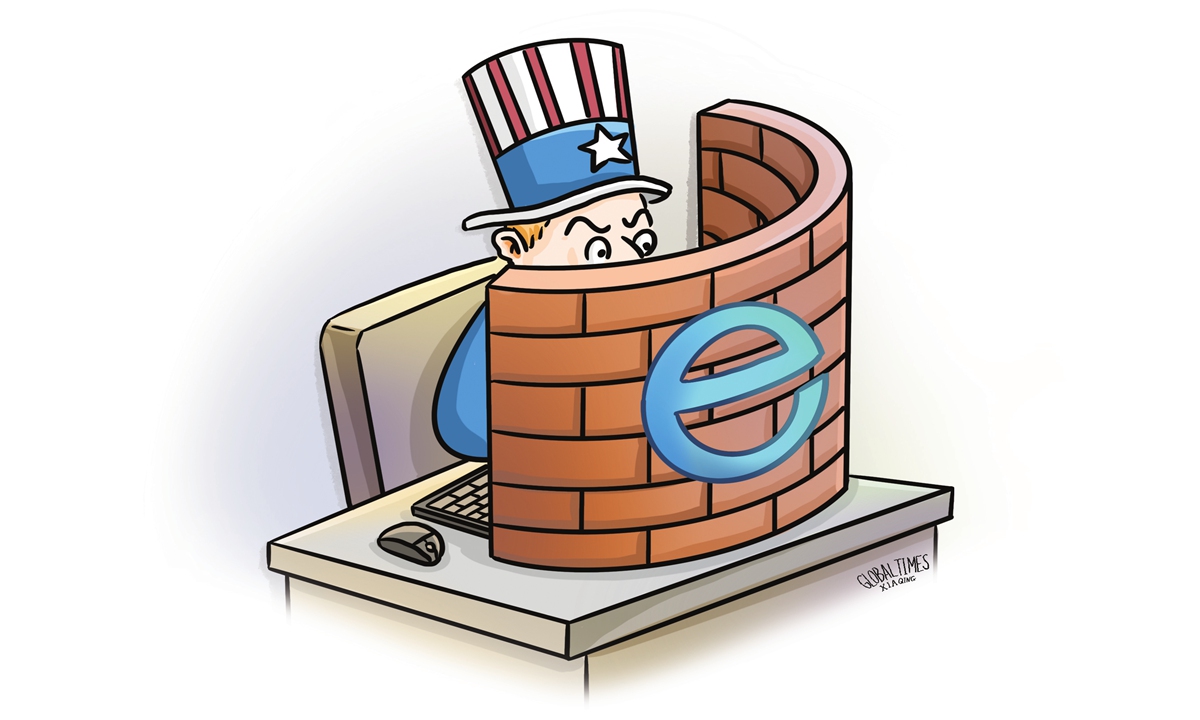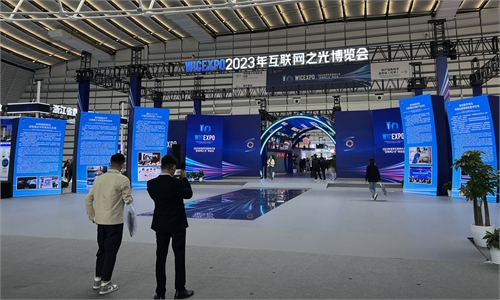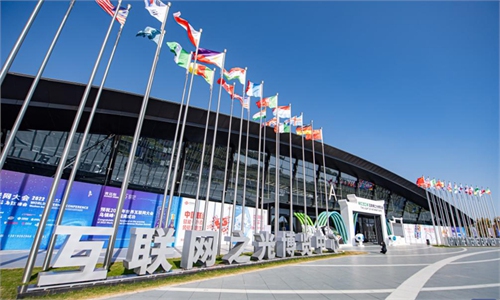
Illustration: Xia Qing/Global Times
Last week, the annual World Internet Conference Wuzhen Summit was held in East China's Zhejiang Province, and China pledged to build a community with a shared future in cyberspace, offering a vision for ushering in a more inclusive and resilient digital world that benefits all people on Earth.
China has always hoped that all countries could enjoy booming e-commerce, internet connectivity, communication and entertainment, and non-stop industry and service sector transformation and efficiency upgrading through constant advances in mobile technology and digital solutions, like the current craze for artificial intelligence (AI).
However, in the past several years, the global digital divide has not been narrowed, and digital technology cooperation in the world has faced waves of headwinds caused by the geopolitical interference and manipulation of some countries. For example, the crippling restrictions on exports of high-end semiconductors and AI chips by the Biden administration to China and other nations are seriously disrupting global digital cooperation and impeding coordinated advances in digital technology, slowing down the global digital transformation.
As always, Chinese scientists and scholars attending the Wuzhen summit advocated that all governments abandon political and economic prejudice, by cooperating more closely on global digital development and opting for more inclusive growth of the all-important internet sector around the world. On global cyberspace governance, China once again put forward the principles of fairness, openness, inclusiveness and non-discrimination.
China has deployed the most advanced and expansive 5G networks in the world, thanks to Chinese enterprises' indigenous efforts to lead the ICT tech revolution and the government's farsightedness at improving the nation's infrastructure. Internet connection speeds and network reliability and security in China have given birth to the prosperity of e-commerce and social commerce.
According to GlobalData, a leading analytics organization in London, China's e-commerce market is expected to reach $2.2 trillion this year. The sizzling internet development in China has reinforced Chinese enterprises' investment in the sector, enabling the country to lead in instant payment methods, digital currency development and numerous digital solutions.
Bridging the global digital divide requires more proactive efforts from all governments and the leading platform and technology companies, which involves narrowing divides in access to, as well as usage and knowledge of, the most advanced and available digital technology in the world.
In the past several years, China's leading ICT players, including Huawei and ZTE, have been helping the world, particularly the Global South developing countries, build internet infrastructure facilities with their homegrown and advanced 4G and 5G mobile broadband technology, assisting more than 100 nations to roll out base stations, networks and optical fiber. As a result, digital connectivity in those countries has significantly improved, benefiting billions of people.
China's commitment to a community with a shared future in cyberspace is aligned with the principles of high quality, mutual respect and inclusive growth. But some developed countries, influenced or coerced by the US government, have moved to turn their backs on Huawei's and ZTE's digital equipment, citing so-called "national security" considerations. The truth is that Washington politicians, for the sake of suppressing Chinese high-tech enterprises, demand its allied countries to shun Chinese technology.
But shunning Chinese high-quality digital gear could be problematic. For example, a network outage at Australia's No.2 mobile operator Optus, lasting more than 13 hours on Wednesday, left 40 percent of Australians without internet or phone service, throwing payment, transport and health systems into chaos, which raises serious questions about the fragility of the country's core infrastructure.
In the UK, 53 percent of mobile broadband customers surveyed complain they have experienced problems with internet connection, from slow speeds to outages and connection dropouts, in the 12 months to January 2023.
The governments of Australia and Britain, at the urging of the US, have refused to use or ripped out Huawei's 5G networks. Nevertheless, Huawei is still the world's biggest telecom equipment vendor, as many countries - excluding the US and its close allies - have opted for Chinese digital technology on the merits of reliability and cost-effectiveness.
In the coming months and years, China's pledge and vision to foster a cooperative future in the global digitalization drive will have significant weight, on account of the country's outstanding role as a prime player in 5G applications, in abundant digital services, in digital payment and e-commerce prowess, and in pioneering big data and AI innovations.
Regarding high-end hardware and software exploration, Huawei has been a global leader - spanning 5G gear, semiconductor design, digital device production, operating systems, AI, cloud computing and autonomous driving.
At the Wuzhen summit, some pointed out that China's vision for global cyberspace governance stood in sharp contrast to the vision put forward by some nations that suggested various alliances and forming exclusive circles or blocs. With the global order being reshaped by digital technology, China has made it clear that the nation will pursue greater dialogue, seek common ground and help build an increasingly digitalized world that is beneficial for all.
The internet, since its inception, has greatly changed the way we live, work and think, profoundly promoting human and social progress. It will continue to reshape our interactions and our living environment in the future through myriad and intertwined innovations such as automation, robotics, big data and AI. The internet sector's development calls for all governments to closely collaborate on technology advances, and it is detrimental to the world if a few countries stick to zero-sum competition by forming exclusive internet clubs, because all of humankind has the right to enjoy the strength of the internet.
The author is an editor with the Global Times. bizopinion@globaltimes.com.cn



